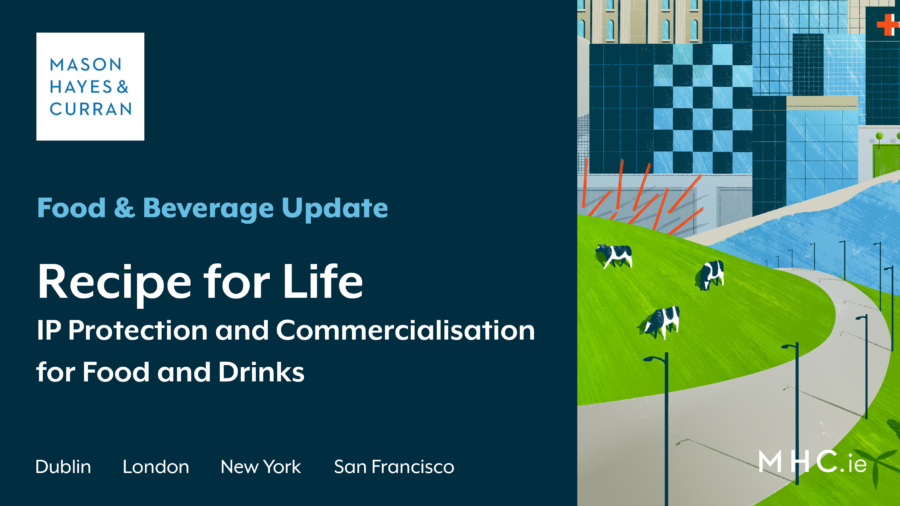Recipe for Life
IP Protection and Commercialisation for Food and Drinks

With increased pressure on global food supply chains and rising inflation, it is more important than ever to ensure that IP is successfully commercialised, to obtain value from intangible assets.
To do this successfully, companies need to identify their IP and secure it before seeking to commercialise it. As commercialisation is a continuing process, it is important for any stage of business, from start ups to established leaders, to have an IP strategy in place.
Choosing the best protection for your IP
To successfully commercialise IP, it needs to be adequately protected. For food and beverage businesses, some IP protection take priority over others.
Trade mark protection applies, not just to the name, but also logos and tag lines. It is also worth considering trade mark protection for labels, which can restrict third party copycats.
Selecting correct territories for trade mark protection is critical - not just territories relevant to sale of the products, but also sometimes, where manufacturing takes place. Foreign language and transliteration trade marks are also important, if exporting food and drinks.
In the food industry, once a successful product is launched in a new style of packaging, it is common to see third party products produced in similar packaging. A good example in Ireland is soup, with various ready-made soups coming in almost identically shaped oval plastic tubs, with somewhat similar ‘get up’. If organisations have a particularly innovative packaging shape, this may be registrable as a registered design. The shape of the packaging may also be registrable as a trade mark, for example something unique like a Coca Cola bottle.
Contractual restrictions on third party packaging manufacturers are also useful if a company creates an innovative package shape. The manufacturer will have the moulds or specifications, so it is necessary to restrict third party sales of the base packaging. This is often the source of third party infringements.
Patent protection is important for certain food manufacturing processes. However, for food and beverages, it is generally more important to keep the recipes and formulations, or the ‘secret sauce’, highly confidential. Appropriate non-disclosure agreements should be implemented and sufficient security measures put in place, for third parties and internally.
In the EU, we have the additional benefit of the EU Trade Secrets Directive (EU 2016/943), which can protect recipes and formulations, which are trade secrets, where applicable.
Copyright will protect the literal expression of a recipe or formulation, rather than the underlying recipe. Copyright will also protect artwork in logos and labels and other materials such as manuals, instructions and source code. It is important that any ownership of copyright works created by third parties such as graphic designers, be assigned to the food company.
Commercialisation of IP
When commercialising, it is useful to regularly undertake IP audits. These show not only gaps, but also any owned IP not used by the company. There may be patents that could be licensed or assigned to others, while not core to the business.
Commercialisation opportunities can vary from product expansion and joint ventures like Baileys chocolates or Cadbury Dairy Milk Oreo chocolate, merchandising and cookbooks to NFTs and white labelling for retailers.
Negotiation issues for licensing include:
- Territory
- Exclusivity
- Royalties
- Term of the licence
- Sublicensing
- Purpose of the licence
The purpose of the licence, which is often overlooked, can be particularly useful in commercialisation as it allows the rightsholder to gain additional revenue streams, from multiple parties, provided the purpose is drafted narrowly enough.
In white labelling of products, there may be additional issues for negotiation, such as in-store product placement, as it is likely that the own label product would displace the rightholder’s product on the shelf and affect its main sales.
Conclusion
The IP commercialisation strategy will depend on the type of business and IP. It also depends on the stage that a business is at, whether a start up or established business. Therefore it is important to continue to review and update the IP strategy.
For more information, contact a member of our Intellectual Property Team.
The content of this article is provided for information purposes only and does not constitute legal or other advice.
Share this:



